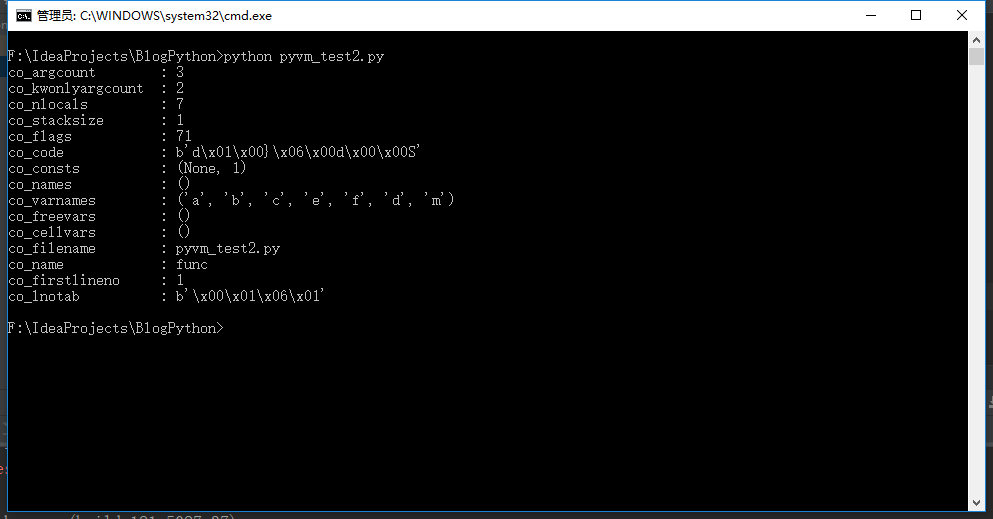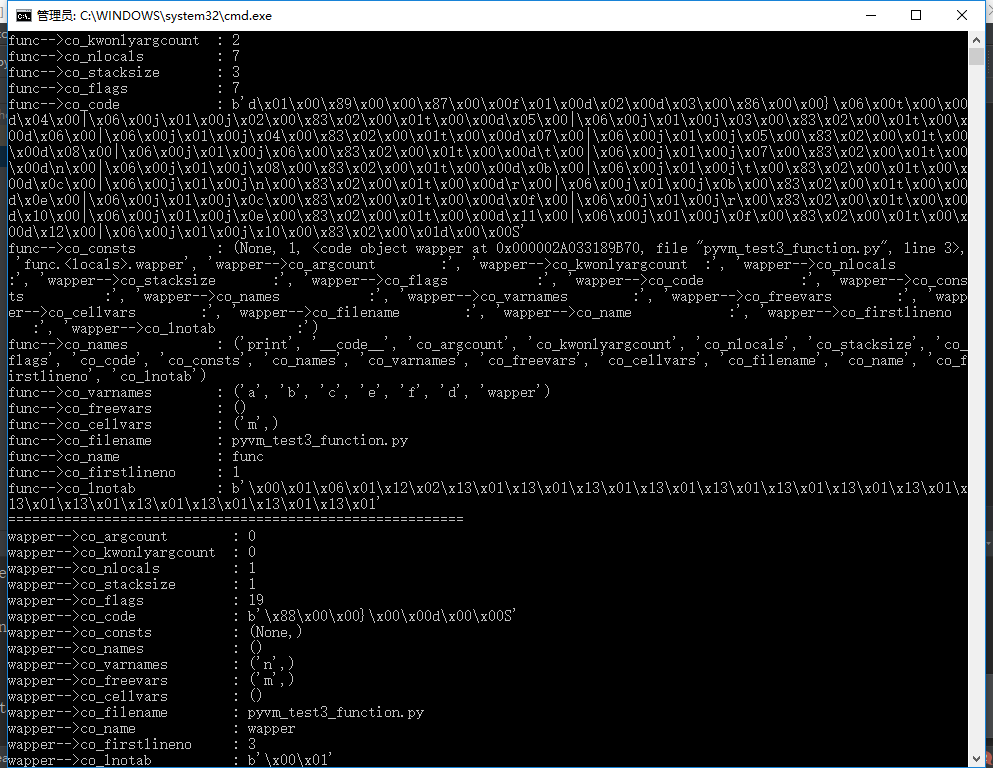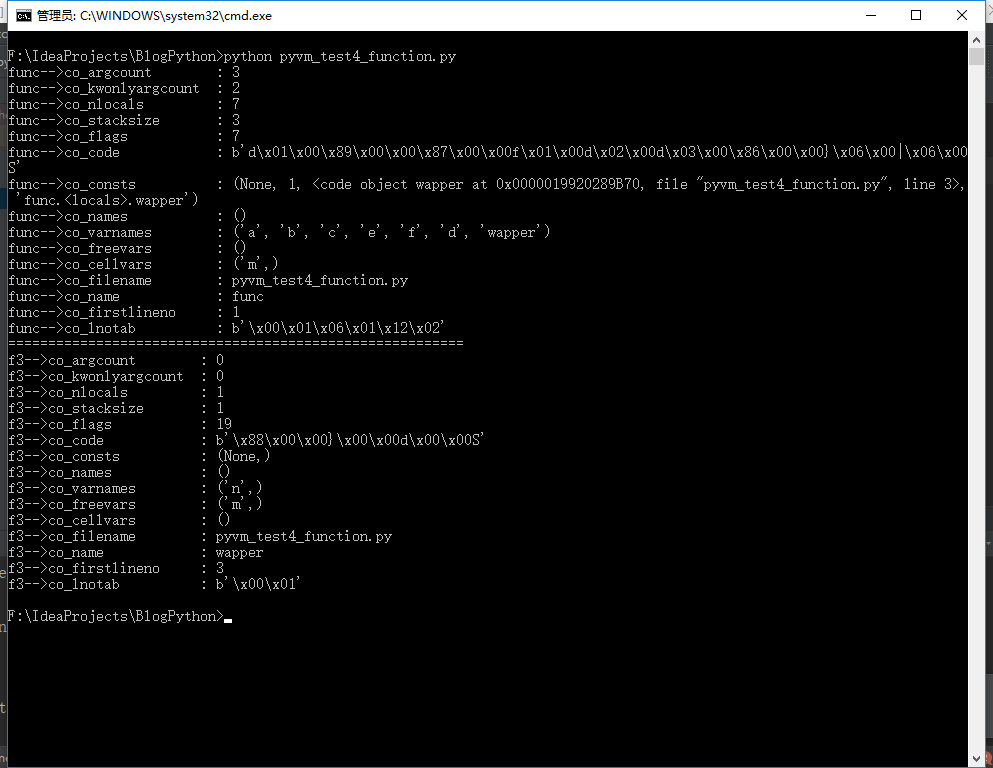Python隨筆(三)虛擬機器執行原理
說到Python的執行機制,就不得不從.pyc檔案和位元組碼說起 PyCodeObject物件的建立時機是模組載入的時候,即import。
.pyc檔案
- 執行 python test.py 會對test.py進行編譯成位元組碼並解釋執行,但不會生成test.pyc
- 如果test.py中載入了其他模組,如import urllib2,那麼python會對urllib2.py進行編譯成位元組碼,生成urllib2.pyc,然後對位元組碼解釋執行。
- 如果想生成test.pyc,我們可以使用python內建模組py_compile來編譯。也可以執行命令
python -m py_compile test.py這樣,就生成了test.pyc - 載入模組時,如果同時存在.py和.pyc,python會使用.pyc執行,如果.pyc的編譯時間早於.py的時間,則重新編譯 .py檔案,並更新.pyc檔案。
PyCodeObject
Python程式碼的編譯過程就是編譯出PyCodeObject物件 下面是Python3.5.7的PyCodeObject定義
/* Bytecode object */ typedef struct { PyObject_HEAD int co_argcount; /* #arguments, except *args CodeBlock中位置引數的個數 */ int co_kwonlyargcount; /* #keyword only arguments */ int co_nlocals; /* #local variables */ int co_stacksize; /* #entries needed for evaluation stack */ int co_flags; /* CO_..., see below */ PyObject *co_code; /* instruction opcodes */ PyObject *co_consts; /* list (constants used) */ PyObject *co_names; /* list of strings (names used) */ PyObject *co_varnames; /* tuple of strings (local variable names) */ PyObject *co_freevars; /* tuple of strings (free variable names) */ PyObject *co_cellvars; /* tuple of strings (cell variable names) */ /* The rest aren't used in either hash or comparisons, except for co_name (used in both) and co_firstlineno (used only in comparisons). This is done to preserve the name and line number for tracebacks and debuggers; otherwise, constant de-duplication would collapse identical functions/lambdas defined on different lines. */ unsigned char *co_cell2arg; /* Maps cell vars which are arguments. */ PyObject *co_filename; /* unicode (where it was loaded from) */ PyObject *co_name; /* unicode (name, for reference) */ int co_firstlineno; /* first source line number */ PyObject *co_lnotab; /* string (encoding addr<->lineno mapping) See Objects/lnotab_notes.txt for details. */ void *co_zombieframe; /* for optimization only (see frameobject.c) */ PyObject *co_weakreflist; /* to support weakrefs to code objects */ } PyCodeObject;
- co_argcount、co_kwonlyargcount
PEP 3102:http://www.python.org/dev/peps/pep-3102/
Keyword-only argument:在函式引數列表中,出現在*varargs之後的命名引數只能使用關鍵引數的形式呼叫。
函式呼叫是引數的賦值順序:位置引數-->關鍵字引數-->可變引數(*varargs)
co_argcount:CodeBlock中位置引數的個數,即:在呼叫時出現的位置引數的個數(不包含可變引數*varargs)。
co_kwonlyargcount:CodeBlock中的關鍵引數的個數,即在呼叫時是出現在可變引數(*varargs)之後的引數個數,可變引數之後的引數均是形式為“keyvalue”的關鍵引數。
>>> def func(a, b, *d, c):
... m = 1
... pass
...
>>> func.__code__.co_argcount
>>> func.__code__.co_kwonlyargcount
- co_nlocals:Code Block中的所有區域性變數的個數,包括code block的引數(co_argcount+co_kwonlyargcount+可變引數個數)+code block內的區域性變數
>>> f1.__code__.co_nlocals
7
a、b、c、m,4個
- co_stacksize:執行該段Code Block需要的棧空間數
>>> f1.__code__.co_stacksize
1
- co_code:Code Block編譯所得的位元組碼指令序列
>>> f1.__code__.co_code
b'd\x01\x00}\x06\x00d\x00\x00S'
- co_consts、co_names
- co_consts:Code Block中的所有常量的元組
- co_names:Code Block中的所有符號(名字)的元組
>>> f1.__code__.co_consts
(None, 1)
>>> f1.__code__.co_names
()
- co_filename、co_name
- co_filename:Code Block所對應的的.py檔案的完整路徑
- co_name:Code Block的名字,,通常是函式名或類名
>>> f1.__code__.co_filename
'<stdin>'#因為是在控制檯裡面所以是stdin
>>> f1.__code__.co_name
'f1'
- co_firstlineno:Code Block在對應的.py檔案中的起始行 test_1.py
def func(a, b, c, *d, e, f):
m = 1
pass
print(f1.__code__.co_firstlineno)
輸出
1
- co_varnames、co_freevars、co_cellvars
- co_varnames:在本程式碼段中被賦值,但沒有被內層程式碼段引用的變數
- co_freevars(freevars:自由變數):在本程式碼段中被引用,在外層程式碼段中被賦值的變數
- co_cellvars(cellvars:被內層程式碼所約束的變數):在本程式碼段中被賦值,且被內層程式碼段引用的變數
普通函式程式碼段測試
def func(a, b, c, *d, e, f):
m = 1
pass
print('co_argcount :', func.__code__.co_argcount)
print('co_kwonlyargcount :', func.__code__.co_kwonlyargcount)
print('co_nlocals :', func.__code__.co_nlocals)
print('co_stacksize :', func.__code__.co_stacksize)
print('co_flags :', func.__code__.co_flags)
print('co_code :', func.__code__.co_code)
print('co_consts :', func.__code__.co_consts)
print('co_names :', func.__code__.co_names)
print('co_varnames :', func.__code__.co_varnames)
print('co_freevars :', func.__code__.co_freevars)
print('co_cellvars :', func.__code__.co_cellvars)
print('co_filename :', func.__code__.co_filename)
print('co_name :', func.__code__.co_name)
print('co_firstlineno :', func.__code__.co_firstlineno)
print('co_lnotab :', func.__code__.co_lnotab)
輸出
co_argcount : 3
co_kwonlyargcount : 2
co_nlocals : 7
co_stacksize : 1
co_flags : 71
co_code : b'd\x01\x00}\x06\x00d\x00\x00S'
co_consts : (None, 1)
co_names : ()
co_varnames : ('a', 'b', 'c', 'e', 'f', 'd', 'm')
co_freevars : ()
co_cellvars : ()
co_filename : pyvm_test2_function.py
co_name : func
co_firstlineno : 1
co_lnotab : b'\x00\x01\x06\x01'

巢狀函式程式碼測試:
def func(a, b, c, *d, e, f):
m = 1
def wapper():
n = m
print('wapper-->co_argcount :', wapper.__code__.co_argcount)
print('wapper-->co_kwonlyargcount :', wapper.__code__.co_kwonlyargcount)
print('wapper-->co_nlocals :', wapper.__code__.co_nlocals)
print('wapper-->co_stacksize :', wapper.__code__.co_stacksize)
print('wapper-->co_flags :', wapper.__code__.co_flags)
print('wapper-->co_code :', wapper.__code__.co_code)
print('wapper-->co_consts :', wapper.__code__.co_consts)
print('wapper-->co_names :', wapper.__code__.co_names)
print('wapper-->co_varnames :', wapper.__code__.co_varnames)
print('wapper-->co_freevars :', wapper.__code__.co_freevars)
print('wapper-->co_cellvars :', wapper.__code__.co_cellvars)
print('wapper-->co_filename :', wapper.__code__.co_filename)
print('wapper-->co_name :', wapper.__code__.co_name)
print('wapper-->co_firstlineno :', wapper.__code__.co_firstlineno)
print('wapper-->co_lnotab :', wapper.__code__.co_lnotab)
print('func-->co_argcount :', func.__code__.co_argcount)
print('func-->co_kwonlyargcount :', func.__code__.co_kwonlyargcount)
print('func-->co_nlocals :', func.__code__.co_nlocals)
print('func-->co_stacksize :', func.__code__.co_stacksize)
print('func-->co_flags :', func.__code__.co_flags)
print('func-->co_code :', func.__code__.co_code)
print('func-->co_consts :', func.__code__.co_consts)
print('func-->co_names :', func.__code__.co_names)
print('func-->co_varnames :', func.__code__.co_varnames)
print('func-->co_freevars :', func.__code__.co_freevars)
print('func-->co_cellvars :', func.__code__.co_cellvars)
print('func-->co_filename :', func.__code__.co_filename)
print('func-->co_name :', func.__code__.co_name)
print('func-->co_firstlineno :', func.__code__.co_firstlineno)
print('func-->co_lnotab :', func.__code__.co_lnotab)
print('=========================================================')
func(1, 2, 3, 4, 5, 6, 7, e = 8, f = 9)
輸出

func-->co_argcount : 3
func-->co_kwonlyargcount : 2
func-->co_nlocals : 7
func-->co_stacksize : 3
func-->co_flags : 7
func-->co_code : b'd\x01\x00\x89\x00\x00\x87\x00\x00f\x01\x00d\x02\x00d\x03\x00\x86\x00\x00}\x06\x00t\x00\x00d\x04\x00|\x06\x00j\x01\x00j\x02\x00\x83\x02\x00\x01t\x00\x00d\x05\x00|\x06\x00j\x01\x00j\x03\x00\x83\x02\x00\x01t\x00\x00d\x06\x00|\x06\x00j\x01\x00j\x04\x00\x83\x02\x00\x01t\x00\x00d\x07\x00|\x06\x00j\x01\x00j\x05\x00\x83\x02\x00\x01t\x00\x00d\x08\x00|\x06\x00j\x01\x00j\x06\x00\x83\x02\x00\x01t\x00\x00d\t\x00|\x06\x00j\x01\x00j\x07\x00\x83\x02\x00\x01t\x00\x00d\n\x00|\x06\x00j\x01\x00j\x08\x00\x83\x02\x00\x01t\x00\x00d\x0b\x00|\x06\x00j\x01\x00j\t\x00\x83\x02\x00\x01t\x00\x00d\x0c\x00|\x06\x00j\x01\x00j\n\x00\x83\x02\x00\x01t\x00\x00d\r\x00|\x06\x00j\x01\x00j\x0b\x00\x83\x02\x00\x01t\x00\x00d\x0e\x00|\x06\x00j\x01\x00j\x0c\x00\x83\x02\x00\x01t\x00\x00d\x0f\x00|\x06\x00j\x01\x00j\r\x00\x83\x02\x00\x01t\x00\x00d\x10\x00|\x06\x00j\x01\x00j\x0e\x00\x83\x02\x00\x01t\x00\x00d\x11\x00|\x06\x00j\x01\x00j\x0f\x00\x83\x02\x00\x01t\x00\x00d\x12\x00|\x06\x00j\x01\x00j\x10\x00\x83\x02\x00\x01d\x00\x00S'
func-->co_consts : (None, 1, <code object wapper at 0x000002A033189B70, file "pyvm_test3_function.py", line 3>, 'func.<locals>.wapper', 'wapper-->co_argcount :', 'wapper-->co_kwonlyargcount :', 'wapper-->co_nlocals :', 'wapper-->co_stacksize :', 'wapper-->co_flags :', 'wapper-->co_code :', 'wapper-->co_consts :', 'wapper-->co_names :', 'wapper-->co_varnames :', 'wapper-->co_freevars :', 'wapper-->co_cellvars :', 'wapper-->co_filename :', 'wapper-->co_name :', 'wapper-->co_firstlineno :', 'wapper-->co_lnotab :')
func-->co_names : ('print', '__code__', 'co_argcount', 'co_kwonlyargcount', 'co_nlocals', 'co_stacksize', 'co_flags', 'co_code', 'co_consts', 'co_names', 'co_varnames', 'co_freevars', 'co_cellvars', 'co_filename', 'co_name', 'co_firstlineno', 'co_lnotab')
func-->co_varnames : ('a', 'b', 'c', 'e', 'f', 'd', 'wapper')
func-->co_freevars : ()
func-->co_cellvars : ('m',)
func-->co_filename : pyvm_test3_function.py
func-->co_name : func
func-->co_firstlineno : 1
func-->co_lnotab : b'\x00\x01\x06\x01\x12\x02\x13\x01\x13\x01\x13\x01\x13\x01\x13\x01\x13\x01\x13\x01\x13\x01\x13\x01\x13\x01\x13\x01\x13\x01\x13\x01\x13\x01'
=========================================================
wapper-->co_argcount : 0
wapper-->co_kwonlyargcount : 0
wapper-->co_nlocals : 1
wapper-->co_stacksize : 1
wapper-->co_flags : 19
wapper-->co_code : b'\x88\x00\x00}\x00\x00d\x00\x00S'
wapper-->co_consts : (None,)
wapper-->co_names : ()
wapper-->co_varnames : ('n',)
wapper-->co_freevars : ('m',)
wapper-->co_cellvars : ()
wapper-->co_filename : pyvm_test3_function.py
wapper-->co_name : wapper
wapper-->co_firstlineno : 3
wapper-->co_lnotab : b'\x00\x01'
閉包函式測試:
輸出:

func-->co_argcount : 3
func-->co_kwonlyargcount : 2
func-->co_nlocals : 7
func-->co_stacksize : 3
func-->co_flags : 7
func-->co_code : b'd\x01\x00\x89\x00\x00\x87\x00\x00f\x01\x00d\x02\x00d\x03\x00\x86\x00\x00}\x06\x00|\x06\x00S'
func-->co_consts : (None, 1, <code object wapper at 0x0000019920289B70, file "pyvm_test4_function.py", line 3>, 'func.<locals>.wapper')
func-->co_names : ()
func-->co_varnames : ('a', 'b', 'c', 'e', 'f', 'd', 'wapper')
func-->co_freevars : ()
func-->co_cellvars : ('m',)
func-->co_filename : pyvm_test4_function.py
func-->co_name : func
func-->co_firstlineno : 1
func-->co_lnotab : b'\x00\x01\x06\x01\x12\x02'
=========================================================
f3-->co_argcount : 0
f3-->co_kwonlyargcount : 0
f3-->co_nlocals : 1
f3-->co_stacksize : 1
f3-->co_flags : 19
f3-->co_code : b'\x88\x00\x00}\x00\x00d\x00\x00S'
f3-->co_consts : (None,)
f3-->co_names : ()
f3-->co_varnames : ('n',)
f3-->co_freevars : ('m',)
f3-->co_cellvars : ()
f3-->co_filename : pyvm_test4_function.py
f3-->co_name : wapper
f3-->co_firstlineno : 3
f3-->co_lnotab : b'\x00\x01'
(9)co_lnotab:位元組碼指令與.pyc檔案中的source code行號的對於關係
Object/lnotab_notes.txt:
All about co_lnotab, the line number table.
Code objects store a field named co_lnotab. This is an array > of unsigned bytes disguised as a Python string. It is used to map bytecode offsets to source code line #s for tracebacks and to identify line number boundaries for line tracing.
The array is conceptually a compressed list of (bytecode > offset increment, line number increment) pairs. The details > are important and delicate, best illustrated by example:
| byte code offset | source code line number |
|---|---|
| 0 | 1 |
| 6 | 2 |
| 50 | 7 |
| 350 | 307 |
| 361 | 308 |
Instead of storing these numbers literally, we compress the list by storing only the increments from one row to the next. Conceptually, the stored list might look like:
0, 1, 6, 1, 44, 5, 300, 300, 11, 1 形成的陣列:0, 1, (0+6), (1+1), (6+44), (2+5), (50+300), (7+300), (350+11), (307+1)
參考文獻:
[python虛擬機器執行原理]https://www.cnblogs.com/webber19

